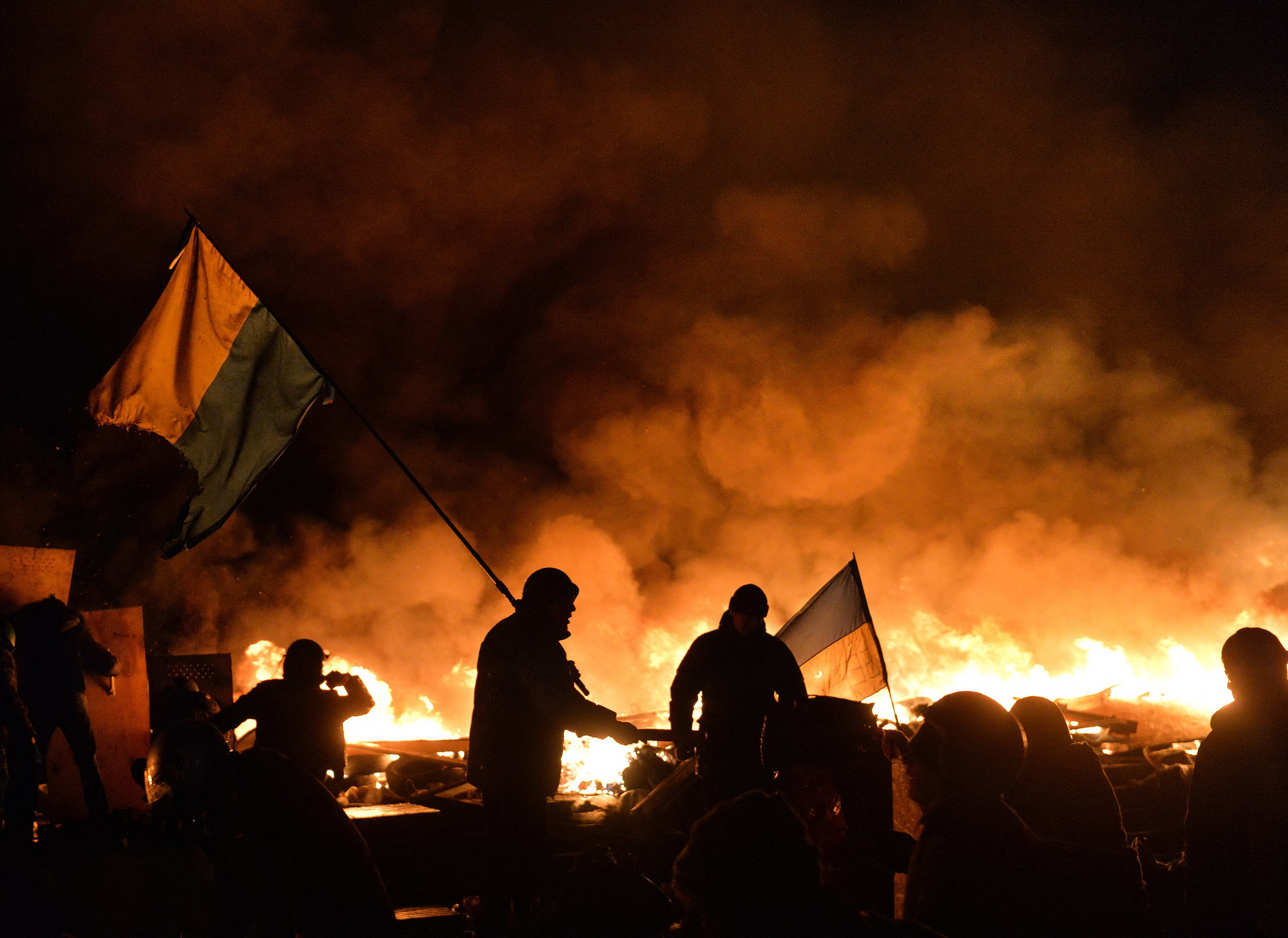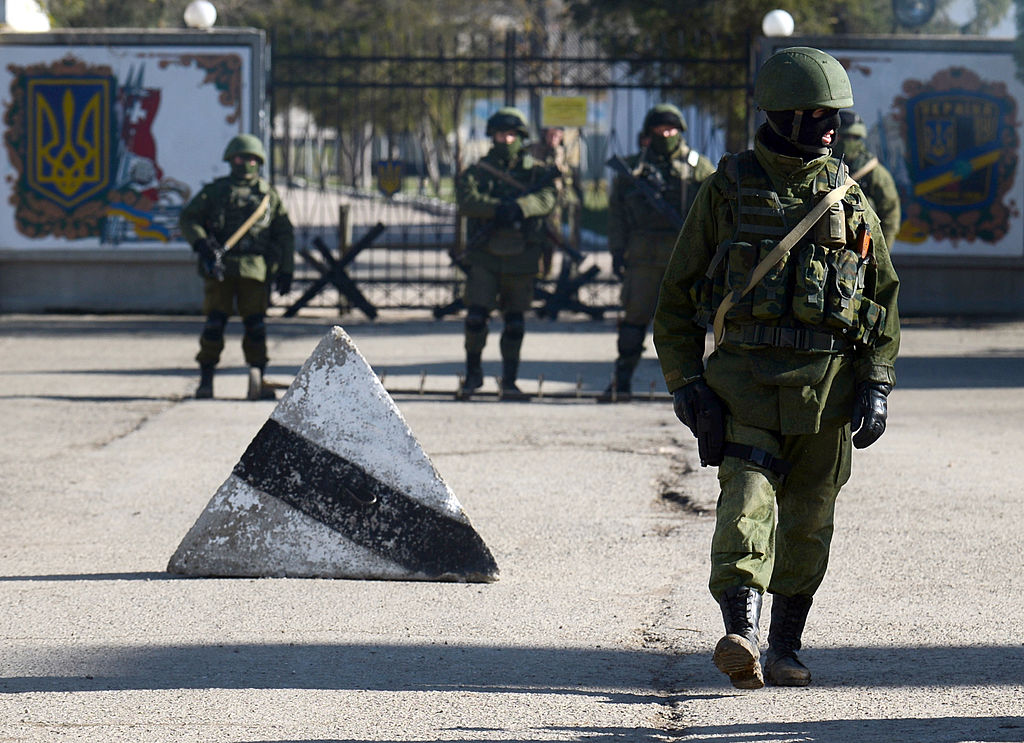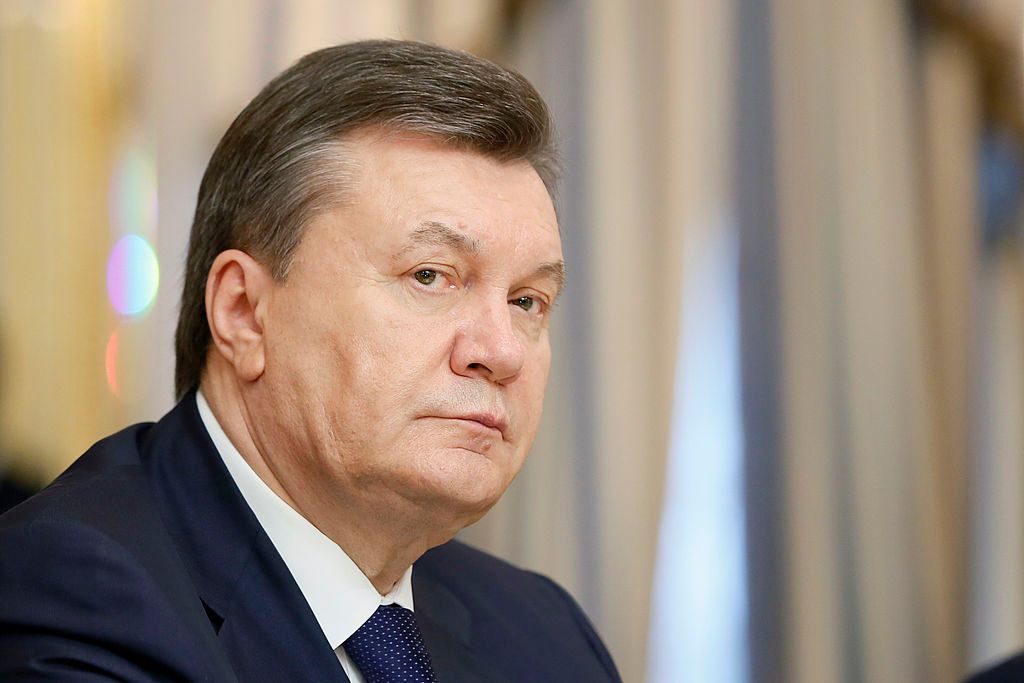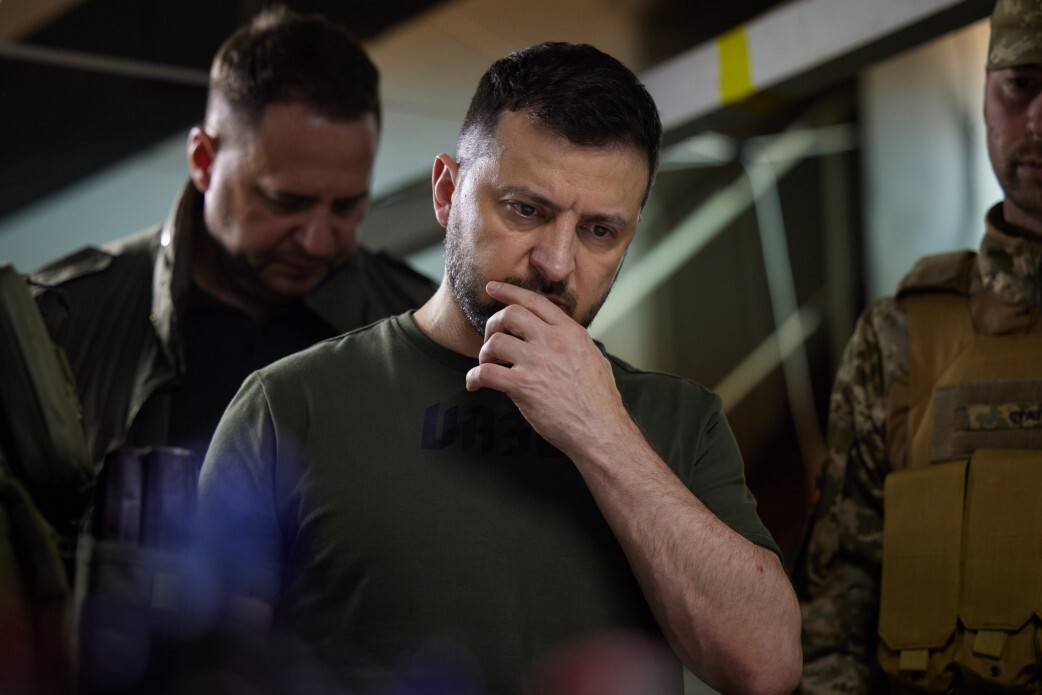EuroMaidan murders case: Why is the verdict criticized, and why is it about Russia?

Almost 10 years after the 2013-2014 EuroMaidan Revolution, a court ruled against those implicated in the murders of dozens of protesters in the revolution's final days.
Yet, the prosecutors and lawyers who fought for years to see a fair trial say justice hasn't been served.
Kyiv's Svyatoshynsky District Court on Oct. 18 issued a verdict that gives the ultimate legal assessment to the most dramatic events of the pro-Western revolution, which ousted pro-Russian President Viktor Yanukovych.
The decision finalizes a long-running trial that began in 2016.
One of the five defendants was acquitted. The others won't see jail either: One of them was released, and the other three are hiding in Russia.
The verdict follows years of what critics say was sabotage of the EuroMaidan cases by the Ukrainian authorities and law enforcement agencies.
"The authorities have done their best to make sure there are no real results," Sergii Gorbatuk, a former top investigator in charge of EuroMaidan cases, told the Kyiv Independent.
"The defendants who are in Ukraine were not held responsible, while those (in Russia) were. It's impossible to implement this verdict," he added.
Ukrainian law enforcement agencies have also investigated whether Russia could have played a role in suppressing the EuroMaidan protests and provoking violence. Experts say that Russia has made efforts to destroy EuroMaidan cases and hide its potential role.
The Svyatoshynsky District Court did not respond to a request for comment.
Court ruling
The five defendants, who are ex-officers of the Berkut riot police, were tried on charges of killing unarmed EuroMaidan protesters on the morning of Feb. 20, 2014.
At least 48 demonstrators were murdered on that day, and at least four police officers were also killed. The prosecutors requested life sentences for all the defendants, who denied all accusations of wrongdoing.
Oleksandr Marynchenko and Serhiy Tamtura were present during the trial. Oleh Yanishevsky, Serhiy Zinchenko, and Vyacheslav Abroskin, who are hiding abroad, were tried in absentia.
The court gave long sentences to those in hiding – Yanishevsky, a deputy commander of a police regiment, received life imprisonment for murder. Abroskin and Zinchenko were sentenced to 15 years each on murder charges.
Those who remained in Ukraine got off easy. Marynchenko was sentenced to five years in jail for abuse of power but was acquitted on murder charges. He was released because he had already spent five years in prison.
Tamtura was the luckiest among the defendants, he was acquitted on all charges.
Both the prosecutors and defense lawyers said they would appeal the verdict.
Yury Aksyonin, the son of killed EuroMaidan protester Vasyl Aksyonin, said on Oct. 18 that he would also appeal the ruling and demand life sentences for all defendants, according to media outlet Suspilne.
Individual or collective responsibility?
According to the prosecutors, the five defendants were accomplices in a terrorist attack on EuroMaidan protesters. However, the court rejected terrorism charges, leaving only the murder and abuse of authority ones.
In many cases, it was impossible to identify which Berkut officer shot specific protesters because they wore face masks or their images in photographs and video footage were of poor quality.
The defense lawyers argued that this means the murder charges cannot be proven.
The prosecutors said that the officers must be convicted for their common actions as part of a criminal group that murdered dozens of protesters, not necessarily for individual murders.
But, the court effectively considered the officers' actions individually rather than collectively, thus dropping murder charges where it was impossible to prove which officer killed which protester.
"Only one (of the defendants) got a life sentence, although all of them should have been given life sentences because all of them were shooting," Svitlana Chapliska, the wife of EuroMaidan protester Volodymyr Chaplinsky, said at the Oct. 18 court hearing.
Chaplinsky was killed on Feb. 20, 2014.

Oleksiy Donsky, a prosecutor in the murder case, said at the court hearing that he saw no logic in the court's decision to differentiate between suspects who were convicted of murder and abuse of power and acquitted on some or all charges, Suspilne reported.
Donsky cited a Supreme Court opinion according to which suspects must be held responsible collectively for their crimes if they were part of one criminal group. It doesn't matter who carried out specific actions in this case, he said.
Supreme Court opinions are mandatory for enforcement by Ukrainian courts.
Sergii Gorbatuk, a former top investigator in EuroMaidan cases, and Vitaly Tytych, a lawyer for EuroMaidan victims, also say they disagree with the court's opinion.
Gorbatuk told the Kyiv Independent that there is plenty of evidence that the Berkut officers coordinated their actions. They must have received similar sentences, he added.
Instead, only the commander was held fully responsible, while the others received lighter penalties or no punishment at all, Gorbatuk said.
Serhiy Dyachuk, the presiding judge in the murder case, argued in an Oct. 21 interview with Ukrainska Pravda news outlet that there is evidence that Yanishevsky, Zinchenko, and Abroskin coordinated their actions as part of one criminal group. However, there is no such evidence in the case of Tamtura and Marynchenko, he claimed.
Gorbatuk rejected this argument as absurd, saying that photos and video footage proved that all Berkut troops, including Tamtura and Marynchenko, coordinated their actions.
Marynchenko and Tamtura made phone calls from the site of the mass murder during the events, and all Berkut officers were photographed and filmed with weapons, coordinating their actions, Gorbatuk said.
Moreover, bullets have been found that were shot from Marynchenko's assault rifle, he added.
A fatal exchange
The bizarre situation in which only two of the defendants were present at court hearings stems from a 2019 agreement reached by President Volodymyr Zelensky and Russia's proxies.
According to the deal, the five Berkut officers were exchanged for Ukrainian prisoners of war held by Russia's proxies in the Donbas.
Both the lawyers representing EuroMaidan protesters and the prosecutors in the murder case were against releasing the defendants. They said the exchange would be illegal because Ukrainian law does not allow the release of suspects in a criminal case for a prisoner exchange.
However, then Prosecutor General Ruslan Riaboshapka replaced the prosecutors with new ones, who agreed to release the defendants.
Both Tytych and Gorbatuk argued that the exchange constituted a crime.
"The (exchange) can be interpreted as a crime," Tytych said. "There is no legal procedure at all. The purpose of the (exchange) was to disrupt the trial. The trial was suspended for one and a half years."
Zelensky's spokesman, Serhiy Nikiforov, and Riaboshapka did not respond to requests for comment.
Surprisingly, two of the five Berkut officers – Tamtura and Marynchenko – remained in Ukraine despite the exchange.
This triggered speculation on their motivation.
"They behaved in a very confident way. I have the feeling that they knew that nothing would happen to them," Gorbatuk said.
Tytych said that "they returned, knowing that they face no threat."
History of sabotage
The 2019 exchange was the latest episode in Berkut troops' quest to escape justice in Ukraine.
In total, at least 27 Berkut officers charged in EuroMaidan cases are hiding in Russia and Russian-occupied areas.
In July 2014, 16 former Berkut officers left Ukraine just before their arrest was planned.
In September 2014, a Kyiv court also released Dmytro Sadovnyk, who headed the Berkut unit involved in the murders, from a detention facility. As a result, Sadovnyk escaped to Russia.
In 2017, another four former Berkut officers investigated for beating and killing EuroMaidan protesters went to Russia by bus.
Berkut troops' flight is just one example of the alleged sabotage of EuroMaidan cases.
EuroMaidan lawyers and Gorbatuk had also previously accused the administrations of both Zelensky and ex-President Petro Poroshenko and their handpicked top prosecutors of blocking EuroMaidan cases.
Officials and police officers implicated in the cases have often been let off the hook, and some cases have been allegedly blocked due to negotiations with Russia.
Spokespeople for Poroshenko and Zelensky did not respond to requests for comment.
Justice in absentia
Berkut officers are not the only ones escaping justice in EuroMaidan cases.
Ex-President Yanukovych has not been held responsible for the killings either, despite being sentenced to 13 years in jail for high treason in absentia in a separate case.
The State Investigation Bureau said on Oct. 4 that it had sent to trial a case against Yanukovych on charges of organizing the EuroMaidan murders.
However, the prospects of the case are uncertain.
Gorbatuk said the trial would take many years since it's even more complicated than the one against Berkut officers and because it involves about 600 victims.
"If the trial against Berkut officers took seven years, then how many years will the Yanukovych case take?" he said.

Moreover, EuroMaidan lawyers and Gorbatuk say that Ukrainian law on in absentia trials contradicts international law, and a potential verdict may be canceled by the European Court of Human Rights.
Previously, only internationally wanted suspects could be tried in absentia, but Interpol often refused to put them on a wanted list, creating obstacles for such trials.
In 2021, the Ukrainian parliament tweaked the law, allowing in absentia trials against suspects hiding in Russia and Russian-occupied territories regardless of Interpol's wanted list.
However, Gorbatuk says the law is still imperfect and may be interpreted by European courts as an example of selective justice since it targets only those hiding in Russia and the occupied areas.
Russia's role
Another major issue in the EuroMaidan investigations is the role that Russia allegedly played during the EuroMaidan Revolution.
The Prosecutor General's Office has investigated whether Russia was behind several escalations of the EuroMaidan Revolution from December 2013 to February 2014. According to this version of events, Russia aimed to trigger bloodshed in Ukraine to have an excuse to launch a military operation and annex Ukrainian territories.
On Oct. 16, Ukraine's State Investigation Bureau said it had charged 20 employees of Russia's Federal Security Service (FSB) in absentia as accomplices in suppressing the EuroMaidan protests in December 2013 and infringing on Ukraine's territorial integrity, sovereignty, national defense, and security.
Gorbatuk said that FSB officers came to Ukraine in December 2013 and in January-February 2014 to help the Yanukovych government suppress the protests, according to the investigators.
Tytych and Gorbatuk believe that Russia was also interested in the release of the Berkut officers in 2019 to disrupt and discredit EuroMaidan investigations and to hide its possible role in the murders.
This is why the fate of EuroMaidan investigations is crucial in the context of how Russia's ongoing war against Ukraine began in 2014.
"This trial is not about 2014 but about now and how this war is going to end," Tytych said.















